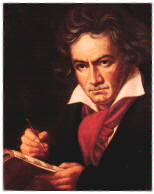|







|

Beethoven's Biography
Beethoven's Childhood
Beethoven's Ascent to Greatness
Beethoven's Demeauor as a Mature Man
Beethoven's View on Performing
His Deafness and the 'Heiligenstadt Testament'
Life After Heiligenstadt
Beethoven's Final Days

|
A German composer of the 18th and 19th senturies Ludwig van Beethoven is one of the most
famous composers in the world in our days.
Ludwig van Beethoven, one of the superme creative artists our civilisation has produced,
was also the most influental composer in history. Nearly all subsequent developments in
"classical" music owe something to his work, and so does the modern concept of the
artist's role in society. Beethoven was born in Bonn, Germany, in December 1770 (the
exact date is not known, but as he was baptized on the 17th his birthday is usually
celebrated on 16th). His father, a court singer eager to exploit his son's precocious
and prodigious musical talent, held him to a rigorous programme of musical discipline.
|
This did not prevent the young Beethoven from developing an intense love of music, but
that dominating, all-consuming love also rendered exceedingly difficult his friendship,
his love affairs and even his everyday dealings with the outside world. His problems
were exacerbated by a hearing loss that made him seriously consider suicide for a time.
When his deafness became acute, it isolated him even further from other people. The
isolation, however, allowed him - forced him, perhaps - to discover and explore new
approaches to compositional and instrumental techniques, and created in him a belief that
music qught to help light the path along which humanity was groping, from misery toward
hapiness, from ignorance toward knowledge. Indeed, he was one of the first major artists
to believe that art had a moral mission, in a humanistic rather than a specifically
religious sense; he transmuted his mistrust of individual human beings into an
overwhelmingly affirmative love of humankind. His nine symphonies, 16 string quartets,
32 piano sonatas and dozens upon dozens of other major compositions constitute not only
an oeuvre of a richness paralleled by few other creative geniuses, but also a
spiritual autobiography of their creator. Beethoven spent most of his active life in
and near Vienna, where he was an eccentric although much respected and far from unloved
figure, and he died there on 26 March 1827.
Multimedia Beethoven Online Encyclopaedia provides completely explanation of Ludwig van Beethoven's
greatest works - his nine symphonies. Please choose the number of the symphony below:

[1st]
[2nd]
[3rd]
[4th]
[5th]
[6th]
[7th]
[8th]
[9th]
[Back]
[Composer]
[Fragments]
[Portraits]
[Download]
[Quiz]
[Magnum Opus]
[Vote]
[Links]
[About]
[Mail]
|
|









